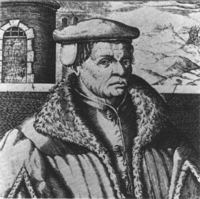 Thomas Müntzer grew up in the Harz Mountains of Germany, a region dotted with mining towns. His parents were from the urban middle class; they had to move home frequently because of religious conflict.
Thomas Müntzer grew up in the Harz Mountains of Germany, a region dotted with mining towns. His parents were from the urban middle class; they had to move home frequently because of religious conflict.Preacher and radical social reformer, b. before 1490 (Stolberg, Germany), d. 27 May 1525 (Mühlhausen).
 Thomas Müntzer grew up in the Harz Mountains of Germany, a region dotted with mining towns. His parents were from the urban middle class; they had to move home frequently because of religious conflict.
Thomas Müntzer grew up in the Harz Mountains of Germany, a region dotted with mining towns. His parents were from the urban middle class; they had to move home frequently because of religious conflict.
The details of Müntzer's early life are sketchy. His name appears in the register of Leipzig University in 1506 and in the register of the university of Frankfurt an der Oder in 1512, where he graduated with a Master of Arts and Bachelor of Theology and became a specialist in Latin, Greek and Hebrew.
From 1513 to 1518 Müntzer worked as a teacher, a preacher and a prior of a monastery. It was a time of great unrest, when the peasants, the tradespeople and the middle class tried, all for their separate reasons, to free themselves from oppressive taxes and rules that hampered their economic progress. This conflict with the ruling princes and ruling representatives of the church took the form of religious protest.
Müntzer, an intellectual and member of the educated elite, followed his own roots and took the side of the middle class. Wherever he worked he initiated secret groups who tried to change society through religious reform. On more than one occasion he was driven out of town and had to find employment elsewhere.
In 1518 Müntzer became attracted to the ideas of Luther and participated in some of Luther's public debates in Leipzig. Motivated to pursue deeper studies he began to interpret Luther's reformation as a fundamental change not only in church practices and church teaching but also in secular affairs and saw in it the beginning of a revolution.
In 1520 - 1521 Müntzer worked as pastor in Zwickau, a mining town where the social conflict drew sharp lines between the upper classes and the miners' guilds. Müntzer's studies had led him towards mysticism. As he witnessed the determination and courage of the working classes he declared that only the common people, driven by an "inner light", could inaugurate the Law of God in this world. The common people could see the inner light because they were in a state of unspoiled ignorance and not distracted by property; they would therefore be able to place the common good above self-interest, drive out all anti-Christian government and install the reign of God.
Müntzer's teaching of the supremacy of the inner light of the Holy Spirit, laid out in many religious, liturgical and political writings, was not only against the Catholic tradition but also in opposition to the Lutheran doctrine of salvation through faith alone, which had found favour with some progressive princes. In his "Princes' Sermon" Müntzer made a futile attempt to win the princes for his revolution. In 1522 he organised the working classes of Mülhausen into the "Eternal Covenant of God" and was again driven out of town, this time by the Lutherans.
When the peasants rose against the princes in 1524 Müntzer returned to Mülhausen, which soon became a centre of the Peasant's War. The local government was replaced by an "eternal council". Unified and strengthened by Müntzer's revolutionary programme the peasants and working people formed an alliance that was joined by free cities and even some minor aristocratic rulers.
After several initial victories the alliance was defeated in the Battle of Frankenhausen on 15 May, 1525. The victorious princes took bloody revenge on the peasants. Müntzer was captured, tortured, tried and executed.
Thomas Müntzer was a revolutionary who fought and died for social justice. He expressed these aims in the religious framework of his time. Unlike Luther, who sided with the princes and was scathing in his attacks on Müntzer and the peasants, Müntzer saw the future of humanity in a society without inequality and exploitation. All his efforts were directed into religious and ethical education, so that the peasants would grasp his concept of a society without social and legal differentiation.
When the Peasants' War collapsed Müntzer took it as a sign that the people were still affected by sin and had therefore been punished by God. He did not see it as a defeat of his vision of the new society. As a religious thinker and theologian he could not analyze that a revolution can only be successful if it is carried by the class that represents a new element of society, an element that requires the overthrow of the old society before it can develop fully.
The peasant class represents the oldest form of social order in all civilizations and thus cannot carry a revolution forward. The history of humanity has seen many peasant revolts and peasant wars - all ended either in defeat or in the installation of a new dynasty that continued the old order. The liberation of the peasants had to wait until the 20th century, when most of the peasant class was forced into factories and swelled the ranks of the working class, a new element of society that made the change of society a necessity.